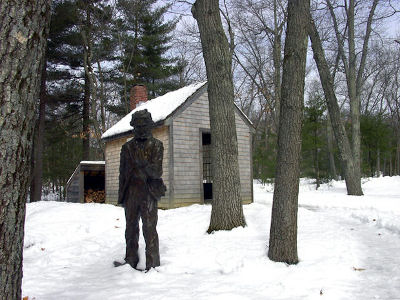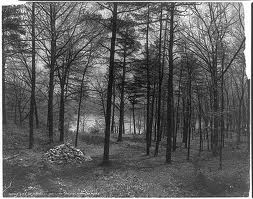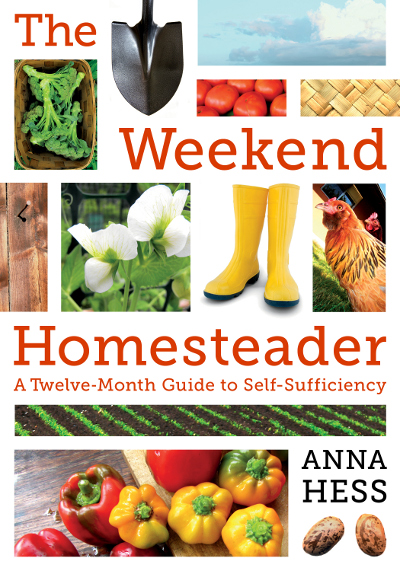
Thoreau on company and being alone
 Before I delve into chapters
5 and 6 of Walden, I want to get a head count
to see who's still reading. I don't mind at all having folks who
haven't read the book comment, but sometimes I can't quite tell if
anyone else is still reading or if we should switch books. So,
please leave a comment if you're still with me! (And, if you're
not, leave a comment to tell me whether you might rejoin the club if we
switched over to something lighter.)
Before I delve into chapters
5 and 6 of Walden, I want to get a head count
to see who's still reading. I don't mind at all having folks who
haven't read the book comment, but sometimes I can't quite tell if
anyone else is still reading or if we should switch books. So,
please leave a comment if you're still with me! (And, if you're
not, leave a comment to tell me whether you might rejoin the club if we
switched over to something lighter.)
This sentence from near the beginning of chapter 6 sums up much of the
gist of this pair of chapters. The themes included being alone
without being lonely, and at the same time making human interactions
more meaningful. I was especially struck by the first theme since
it's one I've wrestled with throughout my life, and I feel is essential
for a homesteader to conquer.
 I hear these same words all the
time, but I seldom come up with as good a reply as Thoreau's:
I hear these same words all the
time, but I seldom come up with as good a reply as Thoreau's:
I think Thoreau and I have two character traits very much in common ---
we're both introverts and neither of us takes friendship lightly.
Although most people don't have the luxury of acres of trees
surrounding their homestead as a buffer, I wish everyone could live the
way we do. I feel like it's much easier to be genuine and kind to
the people I do come in contact with when they're not breathing down my
neck on a regular basis.
Again, I couldn't agree more. We don't get trick-or-treaters,
salesmen, or people trying to convert us to their religion due to our moat, and the mud
definitely separates the wheat from the chaff. In fact, our
choice to keep employing Bradley after he built
our porch was based largely on the fact that he wore quality
waterproof boots and had no problem tromping through the mud.
So, what did you think of chapters 5 and 6? Did different themes
speak to you? Did you find this chapter duo as enjoyable as I did?
Meanwhile, if you're new to the book
club, you might want
to check out the  thought-provoking comments on
chapter
1, chapter
2, and chapters
3 and 4. I'll wait to post a "reading assignment" until
tomorrow, at which point I should have an idea of whether we're all
still getting something out of Walden or would like to move on.
thought-provoking comments on
chapter
1, chapter
2, and chapters
3 and 4. I'll wait to post a "reading assignment" until
tomorrow, at which point I should have an idea of whether we're all
still getting something out of Walden or would like to move on.
Weekend
Homesteader provides
48 fun and easy projects to guide you on the path to
self-sufficiency. Yes, that means I skip Thoreau-style projects
like hewing logs for your cabin with an ax.
Want more in-depth information? Browse through our books.
Or explore more posts by date or by subject.
About us: Anna Hess and Mark Hamilton spent over a decade living self-sufficiently in the mountains of Virginia before moving north to start over from scratch in the foothills of Ohio. They've experimented with permaculture, no-till gardening, trailersteading, home-based microbusinesses and much more, writing about their adventures in both blogs and books.
Want to be notified when new comments are posted on this page? Click on the RSS button after you add a comment to subscribe to the comment feed, or simply check the box beside "email replies to me" while writing your comment.

Actually, I got into commenting thru this Thoreau series. Before that, I was more of an on-line isolationist. The point of being alone in the woods (with Nature) is to be less distracted by people, so more focused--while at the same time, able to drift--to be more meditative. But people are also part of Nature, esp. for those who have to live in inner cities. Some books are companionship, some projects can be a type of companionship. For some older women who live alone, to be alone is actually a luxury...
Glad to see three votes in favor of continuing on! I'll wait to make a decision, though, until I see what everyone else thinks.
(Mom --- you can definitely keep commenting on the blog even if we change our book club read.)
I haven't read the book but I like the topic and am enjoying learning vicariously. The bit above on being solitary and what it really means to be alone vs being lonely ... yep, very homestead-relevent.
I hope you'll continue but, truth be told, it dilutes from the garden and DIY stuff, which is my primary reason for checking in nearly everyday.
I'd rather read on bees, soil critters, water, hardware, tools, kinds of cover crops, etc.
When it comes to Thoreau, I haven't read him because he and I sing in the same choir, so to speak.
It's the HOW, not the why that I come to your blog for...
_/_
J
Although I must admit that I'm really starting to dislike Thoreau's extremely verbose stile. I feel like searching for a needle of meaning in a haystack of verbiage in every paragraph.
There are more authors who do not write really concise, but I find e.g. the works of Alexandre Dumas (père) much more palatable.
It is perfectly possible to live a solitary lifestyle when living in a city. It's just a matter of choice and personal preference.
You can count me as one of the introverts. I rather enjoy a solitary lifestyle. It gives me time to read and think. But this is a highly personal thing. I know people who'd go absolutely crazy if they had to live alone.
As for friends, my best friend lives about 100 miles away. I have siblings living literally across the globe. But physical distance doesn't matter in those cases. It is the distance in the mind and the hart that counts.
There are however situations when living alone is risky. And a remote homestead is one of them. If there is nobody around in case of a serious injury or illness, you might end up dead before your time. This is of course a matter of choice. Living alone in those circumstances implies accepting the risks.
J and Mitsy --- Sorry to use up valuable how-to space with book club stuff. I got lazy --- I really should be posting these at lunchtime and giving you happy farm photos on Monday mornings. Now that the biggest planting push is over, I should be able to do that.
Roland --- I know what you mean about his writing style. The conclusion I've finally come to is that Thoreau wanted to be quotable. And Walden is very quotable, as you can see from my series of posts on the topic. The problem is that if you're reading straight through, his method of writing is very wearing.
I think that Thoreau was getting to the same point you were in your second comment with the third quote I included in this post.
Sheila --- Good luck with your newborn!
I have to agree with some previous posters. I lead a pretty busy life since I am still in the rat race. My cousin and I coincidentally started reading Walden about the same time you decided to start. We have previously read books together like Proenneke's One Man's Wilderness, Into the Wild, etc. and have had no problem getting through them... but we both agree that Thoreau's style makes us weary. I just can't keep interest with my busy life going on. I'd really like to read Walden since there are some gems in there, but I just have a hard time staying interested.
However, I do enjoy reading your footnotes. :P
I'm still reading; I've just fallen behind a bit and am trying to catch up. I would definitely like to continue reading "Walden;" I would like to be able say that I've read the whole thing and I'm not sure that I'll finish it without a little outside incentive. (Nineteenth century philosophical journals are rather more difficult to get into than nineteenth century fiction, I'm afraid.)
As I'm just starting Chapter 4, I'm not really qualified to comment on this week's readings. I am, however, intrigued by what you have included from Chapter 6. Besides being a strong introvert by nature, I am finding it more and more difficult to have patience with people today; perhaps it is, as Thoreau notes, simply that we are living too much in each other's way, and so we all find it harder to be polite and kind to one another. We also find it easier to be disgusted and disturbed by other's bad habits (at least I do), such as spending all of their time on their phones, rather than playing with their children or talking to the people who are right beside them. I think that you are fortunate indeed to have so many trees for neighbors!
So far, the vote is five in favor of keeping on, three in favor of dropping Thoreau like a hot potato, and four who might just be too nice to say how much they hate Walden.
I have to admit that I feel a bit like both Fostermamas and Ikwig. I found myself preferring Thoreau to a fiction book last week, which proved to me that the novel was really bad and needed to be given up on. But, on the other hand, I know I won't finish the book if I don't have the reading club to keep me honest. So I'm going to wait another day and see who else chimes in.
But, on the other hand, I know I won't finish the book if I don't have the reading club to keep me honest. So I'm going to wait another day and see who else chimes in.
I haven't been reading along, but I enjoy re-reading passages you write because it reminds me of lines I forgot from the couple of times I did read it.
I do wish we could see you and Mark a little more often though.
Perhaps, as a compromise, we could keep going in a less busy season...picking up at ch. 9, Th Ponds, when it is winter, as more relevant then, anyway? So, maybe we can "regroup" after we "do" The Village ch.? Someone commented that he was more aware solitude after studying Thoreau on solitude. Maybe taking a break from Thoreau himself--but after the Village ch.--would help us to understand Thoreau as a person, once we "revisit" him?
Everett --- I'm guilty of never visiting anyone. In fact, I leave the farm so seldom that last week I noticed an entire new building had been built a mile from our house in the time since I'd gone there last. But we'd love to see you more! Maybe you'd like to come over and visit our new porch?
Mom --- Good idea! I'm not sure I'd pick the book back up if I put it down, though. Hmmmm....
Solitude & Visitors
Sorry for being so late posting this! I should be all caught up again in a couple days.
I'm not sure how fairly I can comment on solitude -- I like nothing more than to be left alone most of the time, so I am biased strongly in it's favor. Add to this my poor hearing, and I am all the more separated from the world around me. But like Thoreau, I would not say I am lonely. Those things that I -can- perceive and connect with keep me connected all the same. I agree with Adrianne, that books and projects provide a sort of companionship, and solitude allows one to focus better on whatever the need at hand is, whether work, or rest, or play.
Work is an interesting part of all this -- most of us rely on other people to give us some sort of work to do in order to make our livings. This is a major motivation of mine for moving to my own little homestead. To be able to create my own work, and not need to finagle it out of other people, and then being forced to be around them all the time!
Don't mistake that I dislike people, though. We're social creatures, not in the sense that we necessarily all enjoy lots of company all the time, but in the sense that we are affected by and affect others through social interaction. I agree with Anna's observation that it's easier to be genuine and kind to others when there's enough space between us all. Just as Thoreau says when he speaks of needing space for the big thoughts and big words. I like people, but I do not always like the ways we can influence eachother, particularly when we're so crowded with little choice of having more space.
One passage of Thoreau's struck me as apt here --
"Finally, there were the self-styled reformers, the greatest bores of all, who thought that I was forever singing -- 'This is the house that I built; This is the man that lives in the house that I built;' but they did not know that the third line was, 'These are the folks that worry the man that lives in the house that I built' I did not fear the hen-harriers, for I kept no chickens; but I feared the men-harriers rather.'"
What he seems to be saying here, is that the people who think all he's doing is talking about himself and the house he built to avoid living normally have it all wrong. It's not about avoiding the problems of, say, keeping chickens, but avoiding the problems of being so reliant on other people, that their fears, both real and imagined, are also ours.
I also thought it interesting how his visitors were not of his arbitrary choosing, but of all sorts, and he judged them not according to typical social standards, but according to how he got along with them. Think of how people accept or reject people on account of their modes of dress, social status/group, gender, use of language, etc. I'm not sure this can be avoided in densely populated areas. Have you all heard of Dunbar's number? It basically says the upper limit of people we can have meaningful relationships with is about 150. So with lots of people around, this makes us more prone to simplifying them into groups, to bring the sense of how many people we're dealing with down to a manageable number, and in doing that, we lose some degree of our humanity towards eachother. But with a more limited choice of people to visit and be visited by, you tend to get to know people that you might not otherwise have spent time with in the crowded places. And like Thoreau, you might come to realize that "With respect to wit ... there was not much difference between the half and the whole."